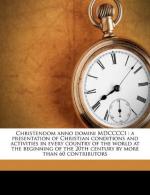|
This section contains 1,779 words (approx. 6 pages at 300 words per page) |

|
The World at the Beginning of the 20th Century
Summary: The world at the beginning of the twentieth century was characterised by tension between tradition and transformation. New ideas about social order were arising that challenged what people had previously believed in and used. Imperialism bought about major conflicts during the early part of the century, and the dominant and accepted values of capitalism were being pushed out of the way for the development of new socialist ideals.
The world at the beginning of the twentieth century was characterised by tension between tradition and transformation. New ideas about social order were arising that challenged what people had previously believed in and used. Imperialism bought about major conflicts during the early part of the century, and the dominant and accepted values of capitalism were being pushed out of the way for the development of new socialist ideals.
IMPERIALISM
Imperialism is defined by The American Heritage Dictionary of English Language as "The policy of extending a nation's authority by territorial acquisition or by the establishment of economic and political hegemony over other nations." Motives for imperialism included economic gain, overshadowing your rivals and also the "white man's burden" - to "cultivate" areas that were considered uncivilised. Imperialism has been used throughout history to gain dominance, however it was extremely important in the early 20th century, and believed by...
|
This section contains 1,779 words (approx. 6 pages at 300 words per page) |

|


